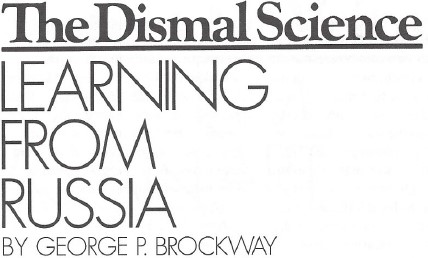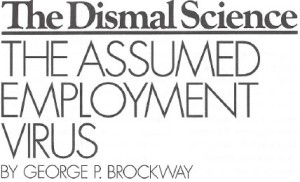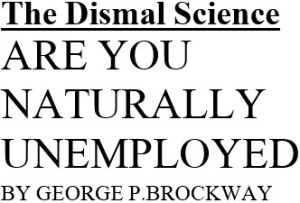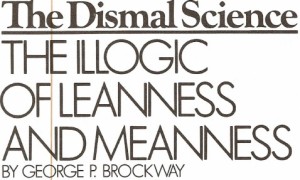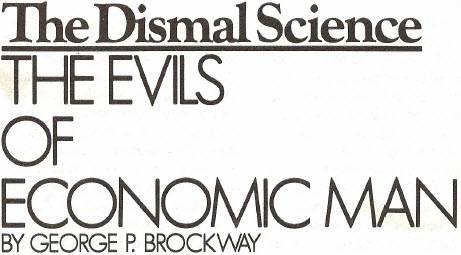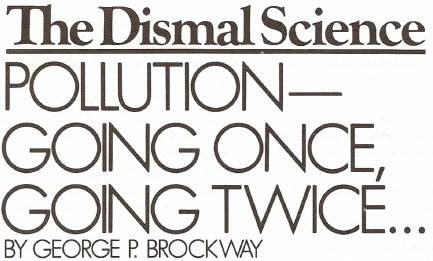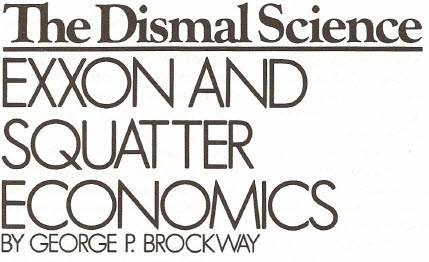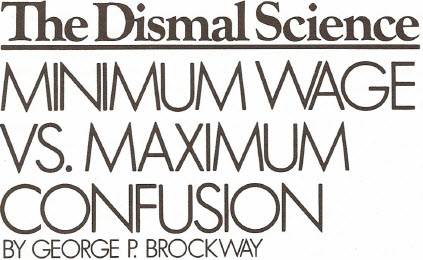By George P. Brockway, originally published September/October 2000
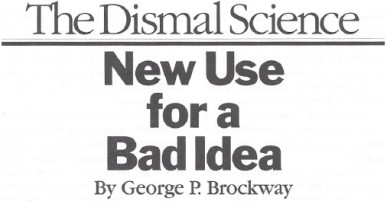
IN ECONOMICS no bad idea goes unused. This is perhaps to be expected in a discipline that prides itself on being the science of the efficient allocation of scarce resources. Ideas are hard to come by in the best of times. With many hundreds of doctoral candidates looking for original dissertation subjects, and many thousands of tenure-track assistant professors looking for profound article topics, nothing that looks like an idea can be allowed to waste its fragrance on the desert air. In addition, there are the diurnal needs of business-page journalists and bond salesmen. Not to mention the problems of NEW LEADER columnists.
A subject that has met all the above needs for at least the past quarter century is the productivity index. It is with mixed feelings that I report on a quite new use that has been thought up for this fallacious procedure. Since, as we shall see, the new use is in the very highest reaches of national policymaking, it is in an especially bad place for a bad idea.
The February 8, 1982, column in this space was titled “Productivity: The New Shell Game.” On May 28, 1984, “The Productivity Scam” appeared. The third antiproductivity- index piece had to wait until May 19, 1993, and the fourth is here and now. Productivity being a protean idea, each column is concerned with a different use of the index.
True to its metaphor of a shell game, the earliest column said that in the new game each of the three shells had a “pea” under it. The first pea, “which always turns up on metropolitan bars and suburban bridge tables,” was that “it just seems people aren’t willing to work the way we did when we were young.”
Next was the “America has gone soft pea.” We let them beat us in Vietnam; investigative journalism got out of hand over Watergate; and now a court has said that creationism isn’t science. It’s hard to tell what the country stands for anymore. It’s no wonder that productivity is down and we have to have this recession to get us back on the track.
Under the third shell was the “archaic industry pea.” Our productivity is down because we don’t invest enough, because we don’t save enough, because we tax business-too much.
In other words, the productivity “peas” were Reaganomic explanations of the recession then stagnating. Regardless of the shell we chose, we got a pea; and regardless of the pea we got, we lost.
By May 1984, the productivity focus had narrowed, with this conclusion: “The uproar about labor productivity is a scam to distract attention from a massive shift in the distribution of the goods of the economy. The share of nonmanagerial labor is being reduced; the share of managerial labor is being increased; and the share of those who do no labor, who merely have money, is being increased most of all. This is what Reaganomics (or, if you will, Volckerism) is all about, and the Atari Democrats have been gulled into going along with it.”
(Those whom the late Robert Lekachman, a wise and witty contributor to this journal, dubbed Atari Democrats called themselves New Democrats. Atari was at one time the leading producer of electronic games, and was early seduced abroad by the promise of cheap labor. What became of it, deponent knoweth not.)
Nine years later (May 19, 1993), the focus had narrowed again. The talk was all about downsizing, a nasty and disgraceful business practice that continues to this day.
The productivity index is thus one of the most powerful ideas of our time. It has malignly affected the lives of millions of men and women, the fortunes of thousands of enterprises, and the economies of nations. It is a tragedy of almost universal scope.
The basic idea of the index is sound enough. Output is divided by input to determine how many units of input achieve a unit of output. The result is an index number that can be compared with other numbers similarly derived. A single index number, of course, is almost useless; but much can be learned from comparisons, and they are of great and daily use in business management. The current performance of a company’s sales (or any other) department can be compared with. its performance in prior years, or with the performance of corresponding departments of the particular industry as a whole. Banks routinely analyze their customers’ profit and loss statements in this way, and trade associations frequently do the same for their members.
It must be confessed that executives sometimes make unreasonable use of the comparisons. A sales department may be faulted for a falling sales index, while the sales force argues that the quality of the product has declined, or that the advertising has been inadequate, or that the sales representative suffer from stress caused by driving poorly equipped automobiles.
Rumbles from the executive floor suggest that the sales reps are too well paid, or that there are too many of them, or that some territories are not worth covering. This is the way that downsizing begins. Every job in every department is ultimately at risk.
Years ago a chapter in a tome on book publishing started this way: “There are two simple principles by which the business thinking of a publishing house should be guided. They are (1) Reducing costs by $1,000 has roughly the same effect on the profit and loss statement as increasing sales by $25,000. (2) You have to spend a dollar to make a dollar.
Downsizing tends to forget the second principle, and also the greater principle that the human beings who are so easily hired and fired are not a means to an end but are ends in themselves. But the ethical objections to downsizing shouldn’t allow us to decide that there are not solid, hard-nosed, business-is-the-only-thing objections to the national productivity index.
THE INDEX numbers are simple fractions: national output for a certain period in dollars (because we can’t add shoes and ships and sealing wax) divided by the hours worked by everyone engaged in production, whether paid or not. Fractions, of course, are not unequivocal; you can increase their value either by increasing the nominator or by decreasing the denominator (2/3 and 1/2 are both greater than 1/3). So you can increase a productivity index number either by increasing “dollars of output” or by decreasing “hours worked.” As we shall see, the hours present a special problem. Consider some examples of how the index works.
First, microeconomically: Think of a journeyman plumber whose output is x, whose hours worked is y, and whose productivity is therefore x/y. Suppose by taking on a plumber’s helper (a human being) he increases his output 20 per cent. Being a rational person, you might conclude that such an increase in output would result in a substantial increase in productivity, but you would be sadly mistaken. According to the formula, his productivity becomes 1.2x/2.0y, or .6x/y, and thus has fallen 40 percent.
We get similar results macroeconomically. Take the 5.4 million or so people counted by the Bureau of Labor Statistics as unemployed. (There are about 10 million more who aren’t counted because they have a part-time job, or are too discouraged to continue looking for work, or are too turned off ever to have seriously entertained lawful employment).
Let’s accept (for argument only) that the conservative press is correct in saying the 4 percent of our civilian workforce officially designated unemployed are so careless, stupid, uneducated, arrogant, sickly or pregnant that they’re unlikely, if employed, to produce on the average more than a third as much as an equal number of those who are currently employed. Even at that level, if we could find the wit and will to employ these people on this basis, we could increase our gross domestic product by 1.2 percent, or about $130 billion a year.
Being still a rational person, you might think such a tidy sum would increase our productivity, but again you would be sadly mistaken. Productivity is still output divided by hours worked or x/y. After finding jobs for the 4 percent of our civilian workforce that is now unemployed, our productivity becomes 1.012x/1.04y, a fall of 2.7 percent.
So if we really believe in the conventional theory of productivity, we must deny help to our plumber and jobs to the unemployed. Unfortunately, a large majority of the members of the American Economic Association do believe in the theory.
A couple of other examples may clinch the case.
A young slugger lived up to his promise by hitting a grand slam home run his first time at bat in the majors. His next time up, there were only two men on base. His manager yanked him because (aside from drawing a walk or being hit by a pitch, neither of which would count as a time at bat) his productivity could only go down.
Then there was the unsung predecessor of Tiger Woods who hit a hole in one on the first hole of a club tournament, but retired when his drive on the second hole stopped rolling two feet short of the cup. “My productivity could only go down,” he lamented as he gave his clubs to his caddy and took up water polo to sublimate his aggressions[1].
THE THING about “hours worked” is that Gertrude Stein couldn’t have said “hour is an hour is an hour” because they aren’t. I was a lousy salesman, though I worked doggedly at it for almost five unproductive and depressing years. Many years later I became a moderately successful CEO of a small company and worked doggedly at that. I put in approximately the same number of hours a day as a salesman as I did as a CEO. After all, there are only so many hours in a day. But the value of my work as CEO really and truly was vastly greater than the value of my salesmanship, and you may believe I was paid more for it, too. Adding those different hours together in the denominator is less sensible than adding apples and oranges.
Karl Marx[2] faced a similar problem when he was wrestling with his theory of surplus value. He finally declared victory and wrote: “We therefore save ourselves a superfluous operation, and simplify our analysis, by the assumption, that the labor of the workman employed by the capitalist is unskilled average labor.” If this was a valid assumption in his day (and it probably wasn’t), it certainly is not in ours.
John Maynard Keynes also felt a need to devise a homogeneous unit of labor. He wrote: “Insofar as different grades and kinds of labor and salaried assistance enjoy a more or less fixed relative remuneration, the quantity of employment can be sufficiently defined for our purpose by taking an hour’s employment of ordinary labor as our unit and weighting an hour’s employment of special labor in proportion to its remuneration, i.e., an hour of special labor remunerated at double ordinary rates will count as two units.”
The minimum wage (currently $5.15 an hour) may be taken as a homogeneous unit of labor. But why bother? It is merely a multiple of a homogeneous unit we already had ($1.00) and tells us nothing new.
Unless you naturally think like an economist, you may wonder why the denominator of the productivity fraction is “hours worked” rather than “dollars paid for labor.” The deep secret is that economists, like well-bred characters in an early 19th-century English novel, are with a few exceptions embarrassed by talk about money. General equilibrium analysis, the most fashionable economic theory at the bulk of elite American universities, can find no place for money in its doctrine. Even monetarism, despite its name, is scornful of the stuff we pay our bills with, which it speaks of as “nominal” money, and insists that what it calls “real” money is what matters, although no such thing exists. (If you’ve read much medieval philosophy, you may find such talk familiar.)
There is another problem with the denominator. We learned in school that the factors of production are land, labor and capital. Some add technology, and Adam Smith wrote of a propensity to barter. In any case, labor is merely one of the factors of production; yet the productivity index treats it as the only one.
To be sure, labor may be the largest factor. A quasi-constant of the economy is that the cost of labor currently runs about 60 per cent of GDP. But the cost of capital-the money spent for interest by nonfinancial, nonagricultural businesses -has increased roughly five and a half times in the past 40 years, partly because the Federal Reserve has increased interest rates, and partly because today American business relies much more on borrowed money than it used to. Common laborers, not Protestant financiers, are now the austere actors on our economic stage[3].
This shift in roles may be good or bad or indifferent, but the productivity index, no matter how constructed, will at best only call our attention to the fact that a shift has occurred. It will neither judge the desirability of the shift nor tell us what to do about it. Econometrics-c-playing with statistics-is the beginning, not the end, of economics.
ALL THAT said, we come to the new use of the productivity index mentioned at the start. I’m sorry, but I can’t say who invented the new use. It was a stroke of genius, even though the Federal Reserve Board had already pioneered the implausible idea of using high productivity (according to the index) as an excuse for trying to reduce production. I’m sorry again, but I can’t say, at least with a straight face, why we should reduce production.
The new scheme goes like this: (1) Production is produced by workers exercising their productivity. (2) The population of workers increases about 1 per cent a year. (3) The productivity index, fallacies and errors and all, increases about 1.5 per cent a year. (4) Put them together, and you get 2.5 per cent a year as the rate at which a well-mannered economy should expand. (5) The economy has been expanding at better than that rate in every year except one in the last eight. (The low one was 2.4 per cent in 1993.) Conclusion: Look out! It must be overheating!
Well, I ask you!
I regret to have to add that the Democratic Party Platform Committee listened solemnly to this kind of stuff. I doubt that the Republicans bothered their heads about it. All they need to know on earth is that a tax cut is beauty, and beauty is a tax cut, especially a tax cut for millionaires. I regret further to have to admit that the economics profession is careless about such nonsense. The other day I read a paper by a friend of mine that was decorated by several equations in which a symbol for productivity occurred. I objected that the symbol stood for a fallacy, and that his equations were therefore fallacious.
He laughed. “Everybody does it,” he said. “You’re expected to do it. It doesn’t matter.”
Well, I’ve already asked you.
The New Leader
[1] Ed: As a similar tale goes, a golfer played at Pine Valley, arguably the best golf course on earth, and in the first four holes had two birdies and two eagles. One eagle was a hole-in-one. He was 6 under par. The fourth green is back at the club house. The golfer walked off the course and into the bar and would not come out as he’d only screw up the round.
[2] Ed: Though likely not as a salesman….
[3] Ed: emphasis mine
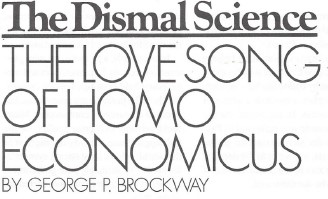
 The wealthy are not the only ones contributing to this trend. The middle class is the beneficial owner, through what are called “institutions” (especially mutual funds and pension funds and insurance policies), of between one-third and one half of all the shares on the current exchanges. By being funded rather than treated as current expenses, these institutions soak up purchasing power and weaken aggregate demand. The funds’ speculating deprives
The wealthy are not the only ones contributing to this trend. The middle class is the beneficial owner, through what are called “institutions” (especially mutual funds and pension funds and insurance policies), of between one-third and one half of all the shares on the current exchanges. By being funded rather than treated as current expenses, these institutions soak up purchasing power and weaken aggregate demand. The funds’ speculating deprives 